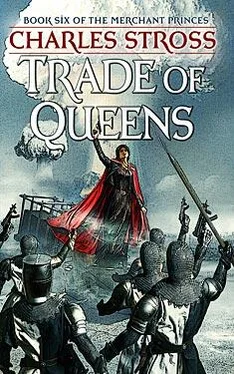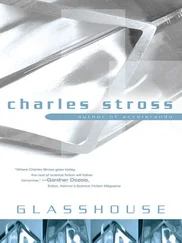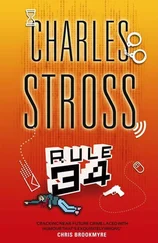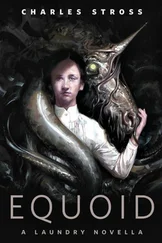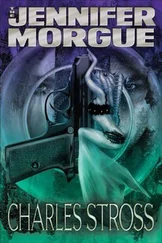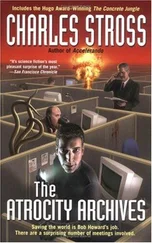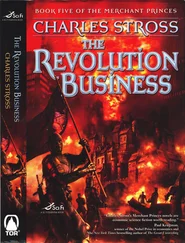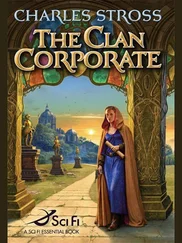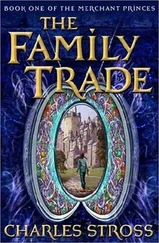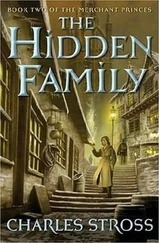Charles Stross - MP 6 -The Trade of Queens
Здесь есть возможность читать онлайн «Charles Stross - MP 6 -The Trade of Queens» весь текст электронной книги совершенно бесплатно (целиком полную версию без сокращений). В некоторых случаях можно слушать аудио, скачать через торрент в формате fb2 и присутствует краткое содержание. Жанр: Старинная литература, на английском языке. Описание произведения, (предисловие) а так же отзывы посетителей доступны на портале библиотеки ЛибКат.
- Название:MP 6 -The Trade of Queens
- Автор:
- Жанр:
- Год:неизвестен
- ISBN:нет данных
- Рейтинг книги:4 / 5. Голосов: 1
-
Избранное:Добавить в избранное
- Отзывы:
-
Ваша оценка:
- 80
- 1
- 2
- 3
- 4
- 5
MP 6 -The Trade of Queens: краткое содержание, описание и аннотация
Предлагаем к чтению аннотацию, описание, краткое содержание или предисловие (зависит от того, что написал сам автор книги «MP 6 -The Trade of Queens»). Если вы не нашли необходимую информацию о книге — напишите в комментариях, мы постараемся отыскать её.
MP 6 -The Trade of Queens — читать онлайн бесплатно полную книгу (весь текст) целиком
Ниже представлен текст книги, разбитый по страницам. Система сохранения места последней прочитанной страницы, позволяет с удобством читать онлайн бесплатно книгу «MP 6 -The Trade of Queens», без необходимости каждый раз заново искать на чём Вы остановились. Поставьте закладку, и сможете в любой момент перейти на страницу, на которой закончили чтение.
Интервал:
Закладка:
Talking to myself. Huh.
It wasn't a terribly good sign. It had been a couple of days—since his abortive meeting with Steve Schroeder—since Mike had exchanged more words with anyone than it took to rent a car. It wasn't as if he was a gregarious type, but hanging out here with his ass on the line had him feeling horribly exposed. And there were loose life-ends left untied, from Oscar the tomcat (who had probably moved in with the neighbors who kept overfeeding him by now) to his dad and his third wife (whom he didn't dare call; even if they weren't in custody, their line was almost certainly on a fully-staffed watch by now). "The time to throw in the towel is when you start talking back to yourself, right? Oh no it isn't, Mike. . . ." The batteries were in, so he hit the playback button.
A beep, then a man's voice: "Miriam? Andy here. Listen, a little bird told me about what happened yesterday and I think it sucks. They didn't have any details, but I want you to know if you need some freelance commissions you should give me a call. Talk later? Bye."
Mike paused, then rewound.
Andy
went on his notepad, along with
freelance commissions.
Probably nothing useful, but . . .
Click.
"Hi? Paulette here, it's seven-thirty, listen, I've been doing some thinking about what we dug up before they fired us. Miriam, honey, let's talk. I don't want to rake over dead shit, but there's some stuff I need to get straight in my head. Can I come around?"
He sat up.
Fired,
he wrote on his pad, and underlined the word twice. This Paulette woman had said
we.
So Miriam had been fired. "When?" That was the trouble with answerphones; the new solid-state ones had timestamps, but the old cassette ones were less than useful in that department. On the other hand, she hadn't wiped these messages. So they'd arrived pretty close to whatever had brought her into contact with the Clan.
Next message:
a man's voice, threatening. "Bitch. We know where you live. Heard about you from our mutual friend Joe. Keep your nose out of our business or you'll he fucking sorry."
Mike stopped dead, his shoulders tense.
Joe,
he wrote, then circled the name heavily and added a couple of question marks.
Not Clan?
he added. The Clan weren't in the cold-call trade; concrete overcoats and car bombs were more their style. Still, coming on top of Paulette's message this was . . . suggestive. Miriam had been fired from her job, along with this Paulette woman, for digging up something. "She's a journalist, it's what she does." Next thing, there was a threatening phone call. Some time not long later, Miriam disappeared. Some time after that, her house was systematically searched for computers and electronic media, by someone who wasn't interested in old paperwork. And then it was booby-trapped and staked out by the FTO. . "Stop right there!" Mike flipped the organizer open and turned to the address divider. "Paulet, Paulette, Powell-et? How do you spell it, it's a first name. . . ."
He read for a long time, swearing occasionally at Miriam's spidery handwriting and her copious list of contacts—She's
a journalist, it's what she does—until
he hit paydirt a third of the way through:
Milan, Paulette. Business intelligence division, the Weatherman.
That was where Miriam had worked, last time he looked. "Bingo," Mike muttered. There was a cell number
and
a street address out in Somerville. He made a note of it; then, systematic to the end, he went back to the cassette tape.
The next message was a call from Steve Schroeder—his voice familiar—asking Miriam to get in touch. It was followed by an odd double beep: some kind of tape position marker, probably. Then the rest of the tape: a farrago of political polls, telesales contacts, and robocalls that took Mike almost an hour to skim. He took notes, hoping some sort of pattern would appear, but nothing jumped out at him. Probably the calls were exactly what they sounded like: junk. Which left him with a couple of names, one of which seemed promising, and a conundrum. Someone had threatened Miriam, right after she'd been fired for stumbling over something. Was it Clan-related? And was this Paulette woman involved? "There's only one way to find out," Mike told himself unhappily. His stomach rumbled. "Time to hit the road again."
The coded electrogram from Springfield followed a circuitous course to Erasmus Burgeson's desk.
Huw's bluff had worked; the cadre at the post office were inexperienced and undisciplined, excited volunteers barely out of the first flush of revolutionary fervor, more enthusiastic than efficient. There was no command structure as such, no uniforms and no identity papers, and as yet very little paranoia: The threats they expected to defend the post office against were the crude and obvious violence of counterrevolutionary elements, fists and guns rather than the sly subtlety of wreckers and saboteurs from within. This was not—yet—a revolution that had begun to eat its offspring.
When Huw claimed to be part of a small reconnaissance cell in the countryside and asked to send a message to the stratospheric heights of the party organization, he was met at first with gape-jawed incomprehension and then an eagerness to oblige that was almost comically servile. It was only when he and Yul prepared to slip away that anyone questioned the wisdom of allowing strangers to transmit electrograms to New London without clearance, and by the time old Johnny Miller, former deputy postmaster of the imperial mail (now wearing his union hat openly), expressed the doubtful opinion that perhaps somebody ought to have detained the strangers pending the establishment of their bona fides, Huw and Yul were half a mile down the road.
Despite deputy postmaster Miller's misgivings, the eighty-word electrogram Miriam had so carefully crafted arrived in the central monitoring and sorting hall at Breed's Hill, whereupon an eagle-eyed (and probably bored) clerk recognized the office of the recipient and, for no very good reason, stamped it with a PARTY PRIORITY flag and sent it on its way.
From Breed's Hill—where in Miriam's world one of the key battles of the American War of Independence had been fought—the message was encrypted in a standard party cypher and flashed down cables to the Imperial Postal Headquarters building on Manhattan Island, and thence to the Ministry of Propaganda, where the commissioner on duty in the message room saw its high priority and swore, vilely. Erasmus was not in town that day; indeed, was not due back for some time. But it was a PARTY PRIORITY cable. What to do?
In the basement of the Ministry of Propaganda were numerous broadcasting rooms; and no fewer than six of these were given over to the letter talkers, who endlessly recited strings of words sapped of all meaning, words chosen for their clarity over the airwaves. So barely two hours after Huw and Yul had shown the cadre in Springfield two clean pairs of heels, a letter talker keyed his microphone and began to intone: "Libra, Opal, Furlong, Opal, Whisky, Trident"—over the air on a shortwave frequency given over to the encrypted electrospeak broadcasts of the party's network, a frequency that would be echoed by transmitters all over both Western continents, flooding the airwaves until Burgeson's radio operator could not help but receive it.
Which event happened in the operator's room on board an armored war train fifty miles west of St. Anne, which stood not far from the site of Cincinatti in Miriam's world. The operator, his ears encased in bulky headphones, handed the coded message with his header to the encryption sergeant, who typed it into his clacking, buzzing machine, and then folded the tape and handed it off to a messenger boy, who dashed from the compartment into the train's main corridor and then along a treacherous, swaying armored tunnel to the command carriage where the commissioner of state propaganda sat slumped over a pile of newspapers, reading the day's dispatches as he planned the next step in his media blitz.
Читать дальшеИнтервал:
Закладка:
Похожие книги на «MP 6 -The Trade of Queens»
Представляем Вашему вниманию похожие книги на «MP 6 -The Trade of Queens» списком для выбора. Мы отобрали схожую по названию и смыслу литературу в надежде предоставить читателям больше вариантов отыскать новые, интересные, ещё непрочитанные произведения.
Обсуждение, отзывы о книге «MP 6 -The Trade of Queens» и просто собственные мнения читателей. Оставьте ваши комментарии, напишите, что Вы думаете о произведении, его смысле или главных героях. Укажите что конкретно понравилось, а что нет, и почему Вы так считаете.
